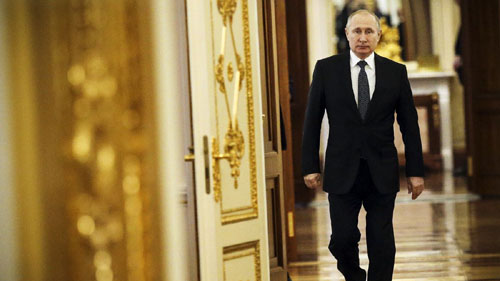by WorldTribune Staff, April 1, 2019
A counter-intelligence investigation should be launched into the anti-Trump dossier authored by ex-British spy Christopher Steele, which was the linchpin of the FBI’s Trump-Russia investigation, intelligence analysts say.
“We have a concerted effort by a group of foreigners to mislead the U.S. intelligence community in the aid of a political hit job on Trump,” said David B. Rivkin Jr., a constitutional attorney and intelligence analyst who served in the Reagan and Bush administrations. “This is a classical counterintelligence investigation.”

Rivkin added: “By definition, since there was no collusion, the dossier was disinformation, so the intelligence community was misled.”
Rivkin cotinued: “The fact that they were duped, even if you take off the table the fundamental illegitimacy of what they were doing, carrying out a hit job on Trump, this still has to be investigated. If you don’t investigate that, what the hell are you supposed to investigate?”
Daniel Hoffman, a 30-year CIA veteran, told The Daily Caller he believes the intelligence community has likely done an assessment of whether the dossier was the product of Russian disinformation, known as dezinformansiya or deza, for short.
“I would hope the intelligence community is doing that,” said Hoffman, one of few former intelligence community officials who have long questioned the premise of the dossier.
In an opinion piece for The Wall Street Journal in January 2018 entitled “The Steele Dossier Fits the Kremlin Playbook”, Hoffman theorized that Russian intelligence knew in 2016 that Steele was investigating then-candidate Donald Trump and planted false information with the former British spy.
“There is a third possibility, namely that the dossier was part of a Russian espionage disinformation plot targeting both parties and America’s political process,” Hoffman wrote.
“If there is one thing I have learned, it’s that Vladimir Putin continues in the Soviet tradition of using disinformation and espionage as foreign-policy tools.”
Hoffman asserted Russians could easily have learned about Steele’s efforts to collect intelligence on Trump, especially if Russian intelligence had hacked into the computer systems of the DNC, as special counsel Robert Mueller has alleged.
The DNC and Clinton campaign hired opposition research firm Fusion GPS during the spring of 2016. Fusion hired Steele in June 2016. During the run-up to the election, Steele and Fusion GPS executives briefed DNC lawyers, reporters and government officials on the Trump investigation. Any emails or documents referring to the Steele project in the DNC computer systems would have been vulnerable to Kremlin-backed hackers.
Additionally, Steele’s private intelligence firm, Orbis Business Intelligence, has handled Russia-related issues.
The Daily Caller noted that “Steele also has a murky business relationship with Oleg Deripaska, a Russian oligarch close to Russian President Vladimir Putin. Deripaska had long done business with Paul Manafort, the Trump campaign chairman.
“Deripaska was spotted at an economic forum in St. Petersburg in June 2016 with Sergei Millian, a businessman who has been identified as a major source for the dossier. Millian was also in contact with George Papadopoulos, a Trump campaign aide who was the FBI’s catalyst for opening its counterintelligence investigation. Papadopoulos is not mentioned in the dossier.”
The FBI relied heavily on Steele’s allegations in the dossier to obtain Foreign Intelligence Surveillance Act (FISA) warrants against Carter Page. In the dossier, Steele alleges Page was the Trump campaign’s liaison to the Kremlin for the purposes of collusion. He is also accused of meeting secretly with two Kremlin insiders to discuss blackmail material on Hillary Clinton and Trump.
Page, who testified before Mueller’s grand jury in November 2017, has vehemently denied the allegations. Like all other Trump associates, he has not been charged with conspiracy in the Mueller probe or any other.
The dossier’s most specific allegation of collusion involves Michael Cohen, the former Trump attorney. Citing his sources, Steele claimed Cohen visited Prague in August 2016 to meet with Kremlin officials to arrange payments to Russian hackers.
Cohen has disputed the claim ever since the dossier was published in January 2017. On Feb. 27, 2019, he testified under oath to Congress that he has never visited Prague. Cohen’s testimony was widely seen as a fatal blow to the dossier.
Steele’s sources also claimed the Kremlin is blackmailing Trump with video of him with prostitutes in Moscow in 2013.
Steele relied on intermediaries to gather information from sources within Russia. According to Michael Isikoff and David Corn, two reporters who published stories before the election based on the dossier, one thread of information that ended up in the dossier was the result of “pillow talk” between a Kremlin official and his paramour.
Rivkin told the Daily Caller he believes Russian intelligence was likely aware of Steele’s activities and allowed them to proceed unencumbered.
“The notion that you can talk to a bunch of connected people in Moscow without the Russian intelligence knowing about it is risible,” Rivkin said, adding that the Russians “decided not to stand in the way of it.”
Your Intel Brief: Geostrategy-Direct __________ Fix The Media Now
